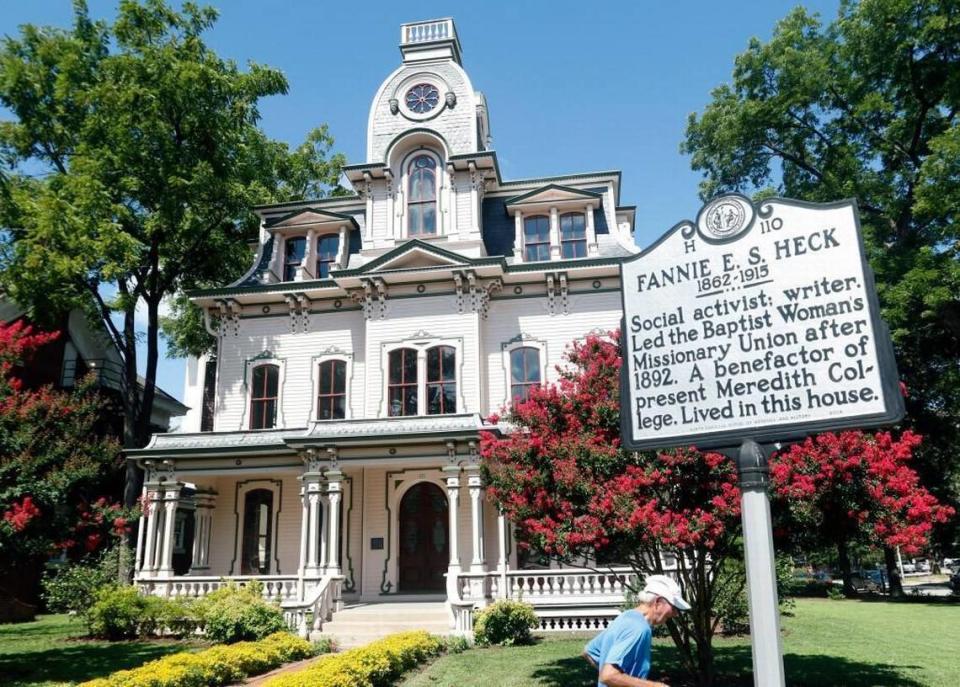NC Realtors group has a beautiful office. But the building’s ugly past troubles some.
Six years ago, the state’s Realtors association paid $1.5 million for one of Raleigh’s grandest old houses — a Second Empire beauty on Blount Street, practically next-door to all the legislative action.
It cost even more to renovate the 1870 mansion, known as the Heck-Andrews house and listed on the National Register of Historic Places. It had sat empty and largely neglected by its last owner: the state of North Carolina.
But now that the house is revived, some of the NC Association of Realtors’ 55,000 members have begun pointing out its uglier past and questioning their own role in confronting it.
A Confederate colonel
Jonathan McGee Heck, for whom the house was built, fought as a Confederate colonel, identifying so strongly with the Southern cause that he left his family in what is now West Virginia and joined with the rebels in Richmond.
He then served in the Virginia legislature during the Confederacy, buying the raw materials to make weapons for the Southern Army. In the years after the war, having become a successful businessman, he and the Hecks relocated to Raleigh and built their ornate house on what was becoming one of Raleigh’s prestigious blocks.
So a century and a half later, some North Carolina Realtors, particularly its Black membership, wonder how they fit into their organization’s showy Raleigh office.
“I don’t think people of color like walking into places that are named for people who have a Southern racist history,” said Monique Edwards, a broker with NC Living Realty. “I don’t. For me, this really becomes a conversation about how organizations purchase things and how do they move forward dealing with properties that are stigmatized.”
‘We cannot change the past’
In a statement sent by CEO Andrea Bushnell on Thursday, NC Realtors said it has been addressing racial inequality in housing for decades through fair and affordable housing policies. The Heck-Andrews House stands close to state lawmakers, allowing the group to continue its work on homeowners’ behalf.
“Like numerous historic properties throughout Raleigh, this property also has a history that ties it to a part of the South’s Confederate past through some of its many previous owners,” the statement read. “Though we cannot change the past, we are committed to recognizing this history and those within our industry who broke racial barriers to help fulfill the dream of homeownership.”

Raleigh has publicly wrestled with its own Confederate past in recent years, watching the state take down three Confederate monuments on the Capitol grounds in 2020.
Just last year, Cameron Village dropped its longtime name and became known as the Village District, cutting ties to its namesake slave owner. The nearby post office soon followed suit, as did the Cameron Park neighborhood.
The downtown statue dedicated to Josephus Daniels, the former white supremacist publisher of The News & Observer, came down in 2020, and the middle school named for him changed to Oberlin.
Historic marker owners Fannie Heck
Local historians do not think Heck owned slaves, having been a young lawyer and real-estate buyer before the war and an urban businessman afterward, focusing much of his attention on drawing investors to the new North Carolina.
The historic marker outside the house is dedicated not to Jonathan Heck, but to his wife Fannie, who was prominent in womens’ missionary work.

Realtors note that North Carolina owned the mansion for many years while it stood in poor condition, and its rebel ties got no mention there, either. Monuments aside, they said, this history will need to be addressed repeatedly as it lives within every building of a certain age.
For Anthony Lindsey, a real estate agent in Charlotte, the question comes down to whether a group with NC Realtors’ size and reach will deal with the Confederate ties in a constructive and positive way.
Does the membership even know about it, he asked, especially those outside Raleigh? Does the organization feel any motivation to address its new office’s Confederate past, given the state’s push toward social and racial justice?
“The crux of the concern for me is, ‘How much do the members know about this history, and how do they feel about that affiliation?’“ he asked. “Where do people stand on this? Or do they care? Maybe they don’t care. I would find it troubling if they didn’t care. I find it troubling that I don’t know that the organization has done a really good job of making members aware.”
History will tell.



